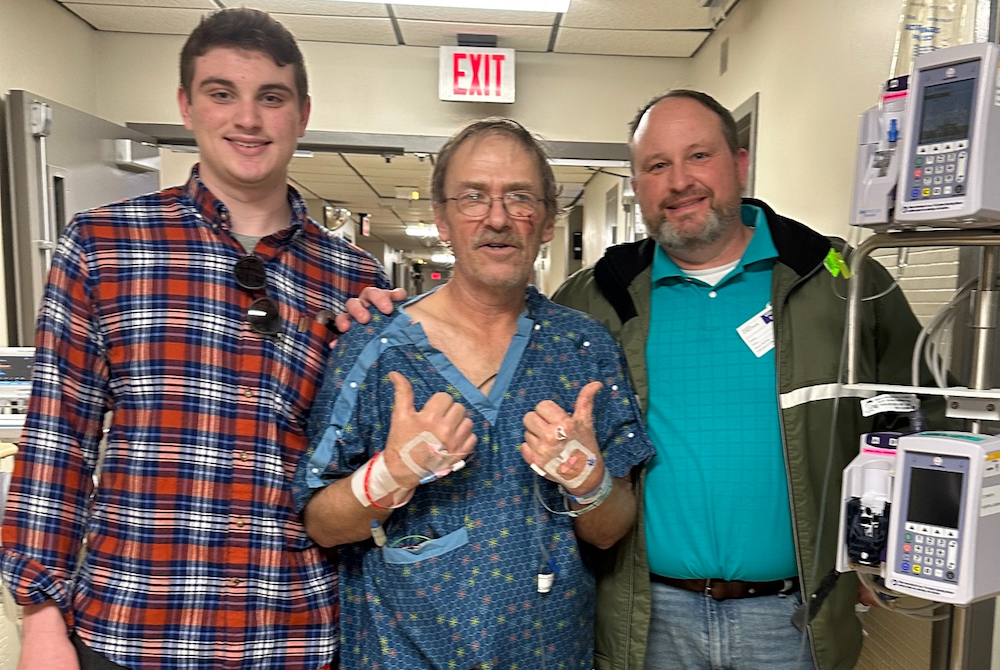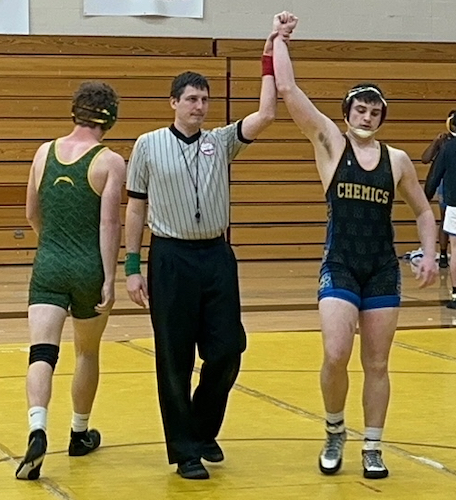
Wrestling’s Next Big Thing
August 13, 2013
“The next big thing” is what marketers often seek. But it’s what school sports administrators usually dread because the “next big thing” is routinely a problem.
And so it is with the sport of wrestling which, at the high school level, has had an admirable record of solving the big issues that have threatened the sport’s existence.
School-based wrestling addressed unhealthy practices for weight loss, first with rules about what could not be done – e.g., rubber suits were banned from practices – and then with rules about what must be done, including a weight management program.
Twenty years ago, MHSAA member schools became one of the early adopters of policies and procedures that include the training of skinfold assessors who are employed to do measurements of all wrestlers, from which each wrestler learns his/her lowest allowed weight and the rate at which he/she may descend to that weight and still remain eligible to compete. These rules, and a nutrition education program, saved interscholastic wrestling from much public criticism and, possibly, from continuing drops in participation.
In addition, the Wrestling Committee has been unique among MHSAA sport committees in recognizing that a season that is too long is neither healthy for nor desired by student-athletes; and the committee has reduced the length of season and number of matches. All of this, combined with the MHSAA team tournament, have greatly increased the sport’s popularity among both participants and spectators.
But in spite of all this, the sport of wrestling is “one communicable skin disease outbreak from extinction,” according to those discussing the state of high school wrestling at a national meeting in June. We’ve already seen an outbreak lead to the suspension of all interscholastic wrestling for two weeks in Minnesota during the 2006-07 school year.
To avoid this next big thing, the rule makers have banned taped headgear, because tape can’t be properly cleaned. The NFHS Sports Medicine Advisory Committee, which is the MHSAA’s advisory body as well, is urging schools to mandate that all participants shower or perform an antiseptic wipe-down after every match.
The MHSAA will make this issue a point of special emphasis in its online, print and face-to-face communications this fall. In addition, an excellent free webinar is provided by the National Wrestling Coaches Association. Click here for the webinar.

Midland Heroes Win 'Match of Life' In Saving Another On Way to Regional
By
Paul Costanzo
Special for MHSAA.com
February 22, 2023
Wilson Shinske woke up Saturday hoping to accomplish something great.
 But the Midland senior had no idea just how great and impactful his accomplishment would be, and that it would happen well before he stepped on a wrestling mat.
But the Midland senior had no idea just how great and impactful his accomplishment would be, and that it would happen well before he stepped on a wrestling mat.
On the way to the Division 1 Wrestling Regional at Hartland, Shinske and his dad, Steve, pulled a man from a burning vehicle on I-75 and helped resuscitate him on the side of the road. As the man was taken by ambulance to a local hospital, the Shinskes got back in their own vehicle and made it to the meet in time for weigh-ins.
“The entire way there, I was thinking, ‘It doesn’t matter if I lose or if I win today, this was a win,’” Wilson Shinske said. “Being on the wrestling team is about being part of something bigger than yourself. Yeah, I lost both of my matches, and it was like that journey has ended. But knowing what I did earlier, I won the match of life.”
Shinske finished his wrestling season with a 21-11 record after dropping his pair of Regional matches at 215 pounds. While all of that was certainly important to him, and the end of any senior season can be tough, the events of Saturday morning put a lot of things in perspective.
“I can tell you that I was proud as hell of him,” Steve Shinske said. “I was super proud of how he handled the morning. I was proud – I’m always proud of him when he does a sport, even when he thinks he doesn’t do well. When he lost, I saw him take those losses on Saturday differently than he had in the past in some of those situations. I think he had a different mindset. After he lost the second match, he went over and sat by a wall, and there were some tears shed. There were a ton of emotions, and not just wrestling emotions.”
Wilson Shinske’s day had started like hundreds of wrestlers around the state, as he left Midland around 5:30 a.m. focused on advancing to the MHSAA Individual Finals at Ford Field.
He fell asleep during the ride, but when the car started to slow down well before he thought it should, he knew something was off.
After coming over the Zilwaukee Bridge, Steve Shinske noticed a car fire ahead. As they approached, the retired Midland fireman decided he would stop and see how he could help, figuring he would see someone outside of the vehicle.
 What he saw, however, was the driver slumped over in the front seat of the pickup truck. He pulled to the side of the road, and as he made his way to the truck, so did Wilson, who had now woken up from his pre-meet nap.
What he saw, however, was the driver slumped over in the front seat of the pickup truck. He pulled to the side of the road, and as he made his way to the truck, so did Wilson, who had now woken up from his pre-meet nap.
“It was 75 at 6 a.m. on a Saturday with no traffic; there’s no way we should be slowing down,” Wilson remembered. “As soon as he put it in park, not even a second later, I’m out of the car.”
As the Shinskes got to the vehicle, Steve noticed the driver – whose name they would later learn is Jerry – still had his foot crammed on the accelerator. That left the rear tires spinning until the tires had burned off and the rims were grinding on the pavement, which caused the fire at the back of the truck. His first move was to put the car in park and shut it off.
They removed Jerry – who they determined was not breathing and did not have a pulse – from the truck, and then Wilson’s training kicked in.
Wilson – a three-sport athlete who carries a 3.8 GPA – plans to study nursing in college, and spends much of his school day working in a hospital as part of a co-op. He’s CPR-certified and plans to work in the ER or a trauma unit.
A point of emphasis in Wilson’s training is to assess the situation in an emergency.
“The car is on fire, the gas tank is in the back of the car, we need to get him away from this,” Wilson said. “We need to get him up in front of our car – put a barrier between us to protect us if something happened. I don’t think there were really any nerves, just more fight or flight. I’m not running away, I’m fighting this. I wasn’t concerned with how cold it was – I wasn’t dressed for 20-degree weather – it was, ‘We have a problem here, let’s fix this problem.’”
Steve started CPR on Jerry while Wilson went back to see if they could find any personal information about him that would help, and 9-1-1 was called.
An off-duty paramedic then arrived on the scene, and put in a call to her supervisor for more assistance. That’s when Wilson took over CPR, and Steve went to put out the fire using snow from the median.
When the supervisor arrived, he brought out an AED to deliver a shock to Jerry’s heart. After some more CPR, Jerry took a gasp of air, and the monitor showed that there was heart activity.
“Then the cavalry came,” Steve said of the rush of emergency vehicles on the scene. He borrowed a fire extinguisher from a police officer to put out the remaining flames, and Jerry was loaded into an ambulance. Wilson said he could see Jerry taking breaths as he was being put into the ambulance.
The whole situation took about 15 to 20 minutes.
“Wilson’s played a lot of sports – football, tennis, he’s wrestled since he’s been 6, he plays golf – he understands that sports gives you perseverance, it gives you a different mindset,” Steve said. “I bet anybody that he works with on the floor at the hospital will tell you that he’s the most outgoing, go-getter co-op student they’ve had. Those things in his life helped him in that situation.”
Jerry survived, and the Shinskes went to visit him in the hospital Monday. While there, they learned from the family that the fire had started to melt the gas tank before Steve was able to put it out. They also learned that Jerry’s wife had recently passed away, and that their quick action had prevented his family from adding another layer of grief in a very short time.
“I love watching (Wilson) wrestle, and I’m going to miss watching him wrestle,” Steve Shinske said. “But watching him on I-75 on Saturday morning was almost better than watching him wrestle. He, as a young man, as a person that’s getting ready to go into the next phase of his life, to be able to handle something like that and not miss a beat was special.”
For Wilson, the experience further cemented his chosen career path, and desire to help others.
“I want to be a part of saving lives more often,” he said. “Not that I want to see people in these situations, but I want to help them when they are.”
 Paul Costanzo served as a sportswriter at The Port Huron Times Herald from 2006-15, including three years as lead sportswriter, and prior to that as sports editor at the Hillsdale Daily News from 2005-06. He can be reached at [email protected] with story ideas for Genesee, Lapeer, St. Clair, Sanilac, Huron, Tuscola, Saginaw, Bay, Arenac, Midland and Gladwin counties.
Paul Costanzo served as a sportswriter at The Port Huron Times Herald from 2006-15, including three years as lead sportswriter, and prior to that as sports editor at the Hillsdale Daily News from 2005-06. He can be reached at [email protected] with story ideas for Genesee, Lapeer, St. Clair, Sanilac, Huron, Tuscola, Saginaw, Bay, Arenac, Midland and Gladwin counties.
PHOTOS (Top) From left: Wilson Shinske, Jerry and Steve Shinske meet Monday, two days after the father and son helped save Jerry’s life on I-75. (Middle) Wilson Shinske, far right, has his arm raised in victory after a match. (Photos courtesy of the Shinske family, with permission.)

